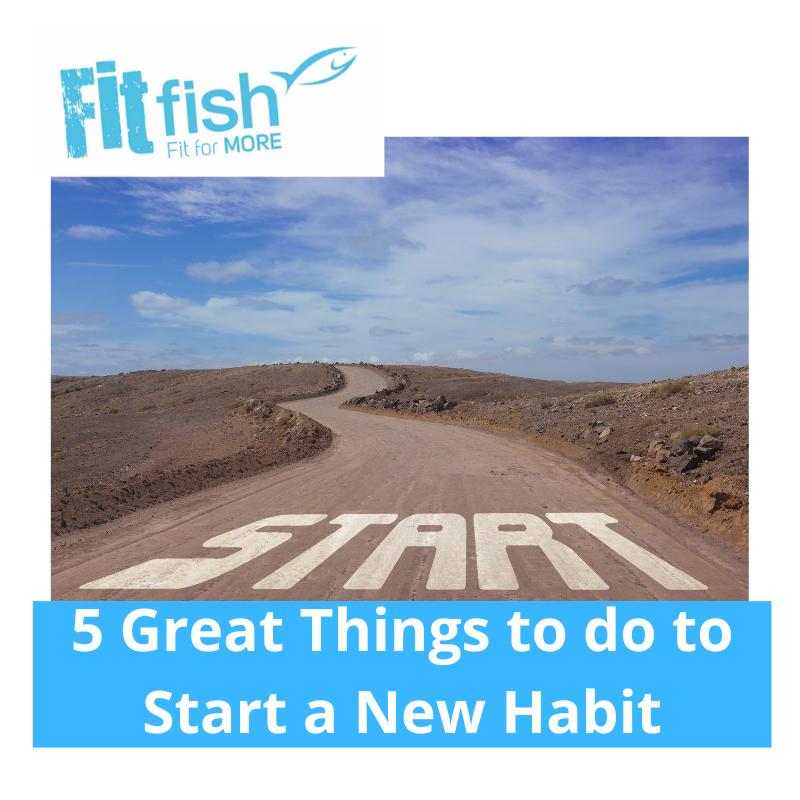5 Great Things to do to Start a New Habit

What habits have you already done today before you’re reading this email?
Perhaps it was brushing your teeth, drinking a glass of water, having your morning cuppa, checking your social media while walking the dog, making your bed…
Habits are the building blocks of our lives. They dictate our lifestyle.
There is a powerful quote from James Clear, the author of Atomic Habits, that says: “We don’t rise to meet our goals; we fall to the level of our systems”. These systems are our habits.
Habits are the steps, lifts, elevators, and moving platforms that get us to where we want to go.
You can probably think of several habits that you already have in place that make you the kind of person that you are. Perhaps they include some of these:
- Reading fiction regularly
- Watching the news each night
- Studying a subject each week
- Playing an instrument regularly
- Going to the gym a few times a week
- Walking daily
- Eating mainly natural food
- Putting money into a piggy bank each day
- Setting aside money for your children in your life each month
- Speaking with friends and family regularly
- Writing birthdays onto a calendar or into your diary each month
- Putting your clothes away at night
Many of my clients start off by telling me that they really struggle with willpower or motivation.
But it is hard to start a new habit with just motivation and willpower alone. When we rely on these things, it’s no wonder that we struggle to keep new behaviours up until they become habits.
That’s why it’s important to make it as easy as possible in other ways.
Here are 5 things that you can do to increase the likelihood of your habits sticking and becoming part of you and who you are:
Ensure the habit is in line with your values
Do you believe that the new habit that you want to create is in line with the person that you want to become? Is it something that you want to continue doing for the rest of your life and can see that happening? Or is it just a phase or a whim?
When a new habit is aligned with what’s important to you, it’s more likely that it will continue and become ‘autopilot’ for you.
Environment
Remove as many obstacles as you can and make things as easy as possible to action, so that your willpower and motivation will have less of a workout.
What could trigger your memory to do the new habit?
What could make the new habit easier?
- Leaving your water bottle visible?
- Setting your alarm for 10 minutes earlier?
- Placing snacking vegetables on the middle shelf in the fridge? Preparing your lunch the night before?
- Arranging to walk with a friend?
- Keeping your trainers by the door?
Make your environment work for you, and you won’t need as much mental and physical energy to get and keep going.
Small is better than not at all
The important thing is to get started and get your brain used to starting to perform this new habit. Even if that’s just the first stage of the action.
Perhaps the first goal is to start sitting at the table for lunch rather than grabbing food on the go.
Or maybe it’s introducing one more portion of vegetables a day.
This will help to rewire your brain and make the next time you do the behaviour easier. Starting is the hardest part, so make the starting easy and it will be easier to form the habit.
Be Consistent
Quantity makes a great story, but consistency changes your story!
If you climb a mountain or run a marathon that is a brilliant story and something to be proud of! BUT, doing that one big thing does not necessarily change your habits and therefore your lifestyle and identity.
It’s the consistency of your new habit that matters. Perhaps you just need to start with doing the behaviour once a week and then once that is established increase it to twice. This also reduces the mental barrier and means that you come away from the ‘all or nothing approach’ which can be detrimental when starting new habits.
Reward
Some habits award us instantly (cleaning your teeth, having a shower, stretching after exercise, making your bed, etc.) but others take a while before there are any tangible ‘results’.
This can be disheartening and cause you to give up the routine too easily. What are the other ways in which you can reward yourself until the habit brings its own reward?
- Perhaps you can put £1 in a jar every time you don’t buy sweets at the petrol station.
- Perhaps you can use some of the money saved making your own lunch to buy a coffee at the end of the week?
- Perhaps you can walk while you listen to a podcast that you won’t allow yourself to listen to at any other time?
Try putting some of these ideas into practice when establishing your new habits, and you will probably find that you don’t need to rely on your motivation and willpower as much as your lifestyle changes more easily and effectively.
You can learn more about changing habits in the Healthy, Whole & Free Course.
Comments
Add comment